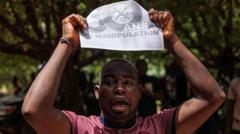Amid growing repressive measures, Mali's military junta has taken the drastic step of dissolving all political parties, further entrenching its grip on power while facing demands for democratic governance.
Mali's Military Junta Bans Political Parties, Escalating Authoritarianism

Mali's Military Junta Bans Political Parties, Escalating Authoritarianism
The military regime in Mali has dissolved all political parties, intensifying its crackdown on dissent and delaying the country's return to democracy.
Mali's military rulers have executed a sweeping measure to dissolve all political parties across the nation, intensifying their authoritarian grip following a series of coups. This announcement, broadcasted on state television, comes as the junta faces mounting pressure to restore democratic processes.
Military leader Assimi Goïta, who took control after the coups in 2020 and 2021, validated this decree, asserting that all political gatherings are now prohibited. This move, expected to incite resistance, follows earlier pledges by the junta to return the country to democratic rule, which now appear largely abandoned as they solidify their hold.
Since last year, the military eroded freedoms, cracking down on political activism, with recent events heightening tensions; two opposition leaders were reportedly abducted by individuals posing as police during a rare pro-democracy protest. The junta's silence on these events has raised alarms among human rights advocates.
In a recent conference boycotted by key opposition factions, the recommendation emerged to appoint Gen Goïta as permanent president until 2030, attracting widespread condemnation. Amid these developments, the junta’s presidential decree further warned citizens against disregarding the dissolution order, although no specific punitive measures were outlined.
The main opposition coalition has yet to respond in detail, but member Nouhoum Togo, president of the Union for the Safeguarding of the Republic, expressed defiance through social media, asserting that the military's actions would not erase their political significance.
This decree follows an earlier suspension of all political activities recommended by the national conference, which had reverberated through the political landscape, sparking outrage and plans for protests that were subsequently postponed.
In a broader regional context, Goïta's alliance with fellow coup leaders in Burkina Faso and Niger signals a shift towards Russia and away from France, highlighted by Mali's withdrawal from the regional Economic Community of West African States (Ecowas) which demands a return to democracy. These developments mark a critical juncture in Mali's political future and the region's dynamic power structures.


















